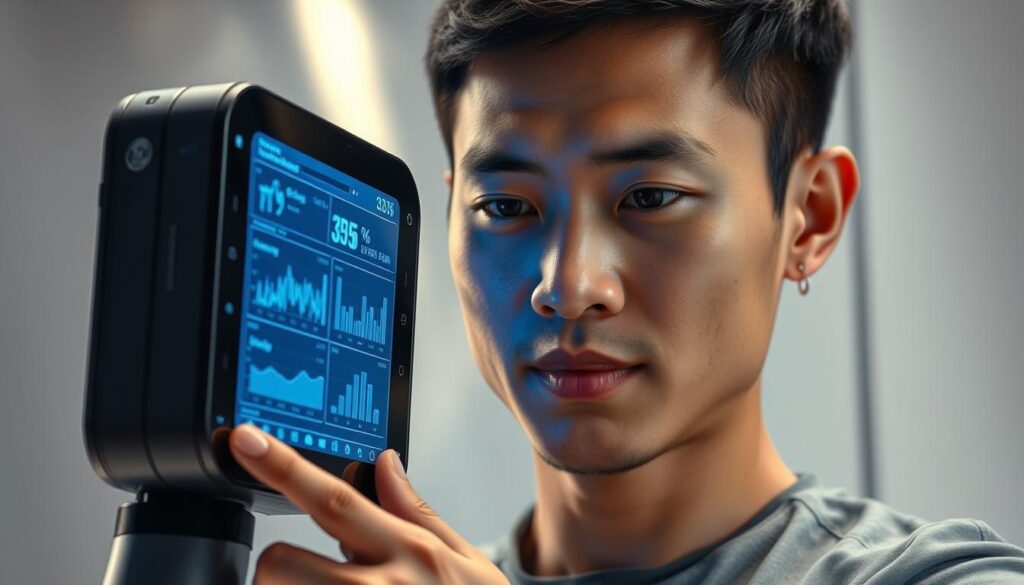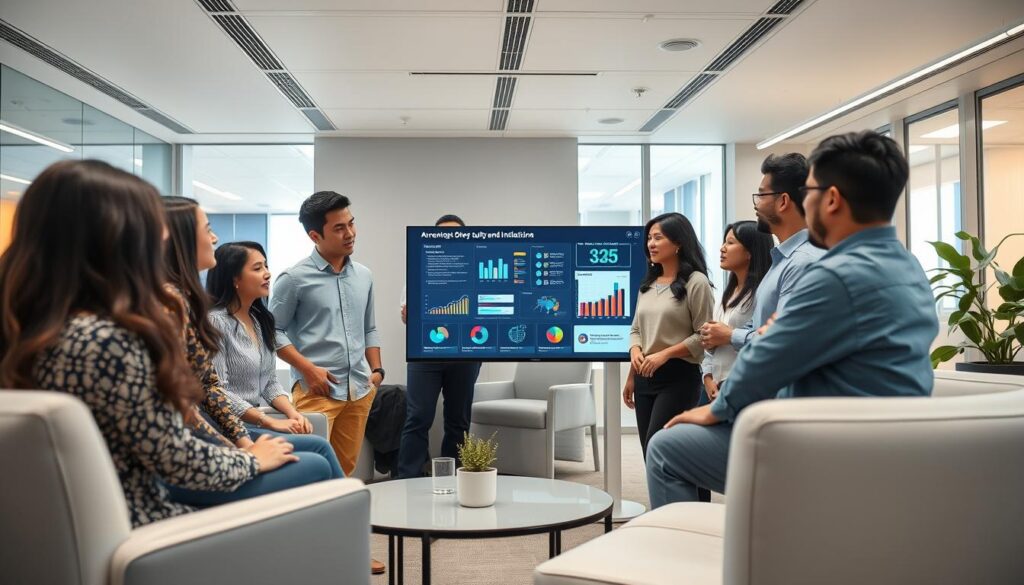Have you ever thought about AI helping to remove bias at work? In today’s world, where everyone wants to be included, using AI for Diversity, Equity, and Inclusion (DEI) is crucial. AI is becoming a key tool to fight discrimination and bias in the workplace.
It can change how we do HR, hiring, and performance reviews to make things fair and equal. This part looks at how AI can help make work places fair for everyone in Southeast Asia.
Key Takeaways
- Understanding the significance of AI in promoting bias-free workplace policies.
- How AI can transform recruitment processes by mitigating bias.
- The role of AI in ensuring fair performance evaluations.
- Case studies highlighting successful AI implementation in DEI.
- Exploring ethical considerations in AI deployment.
Introduction to AI in the Workplace
AI in the workplace is a big step forward for companies. It’s changing how businesses work. AI is being used in Human Resources to make things better.
AI helps with tasks like finding the right people for jobs and checking how well employees are doing. It also helps keep employees happy and working well together.
AI uses smart algorithms and data to make things run smoother. It helps solve problems like unfair treatment in the workplace. This leads to a fairer place for everyone.
By using AI, companies can create a welcoming space for all. This makes employees happier and more likely to stay with the company.
The Importance of Bias-Free Policies
Creating a culture of workplace equity starts with bias-free policies. These policies are more than just ethics; they make workplaces thrive. When employees feel valued and respected, they are more likely to stay and do their best.
Companies that value inclusivity often lead in innovation. Diverse teams bring new ideas and solve problems better. This shows how crucial it is to have strong bias-free policies.

AI in Diversity, Equity, and Inclusion (DEI)
AI changes how companies work on DEI. It uses smart algorithms and big data to find gaps in the workplace. This helps businesses create better hiring plans that attract more diverse candidates.
Diversity analytics are key to tracking DEI progress. They help find and fix unfairness. This way, companies can avoid biases in hiring and support all employees.
Studies show AI helps in DEI efforts. It makes workplaces more creative and solve problems better. Using AI, companies not only meet standards but also make sure everyone feels important and has a say.
How AI Enhances Recruitment Processes
AI is changing how companies hire people. It helps fix biases in job ads and makes picking candidates fairer. This way, companies can find the best people without bias.
Mitigating Implicit Bias in Job Descriptions
Job ads can sometimes push away certain groups without meaning to. Tools like Hilton’s Datapeople make ads welcoming to everyone. This helps companies get a diverse group of applicants.
By using inclusive language, companies can focus on what candidates can do, not who they are. This makes hiring fairer for everyone.
AI-Powered Candidate Screening
AI makes finding the right candidate easier and faster. It looks at applications without knowing who they belong to. This way, hiring is fair and unbiased.
Companies like Box use AI to help with interviews. It makes feedback useful and asks the right questions. This helps teams make choices based on facts, not guesses.
AI’s Role in Performance Evaluation
AI changes how we evaluate performance by using data in HR. This new way looks at how well employees do based on clear results. It makes the workplace fairer for everyone.
It focuses on facts, not just opinions. This helps companies see the value of all employees’ work.
Data-Driven Performance Metrics
Using data to measure performance is key. AI in HR helps gather and understand lots of data. This gives insights into how well employees are doing.
It makes sure evaluations match company goals. This way, rewards are based on real achievements, not just guesses.
Reducing Subjectivity in Promotions
Promotion AI helps make promotions fair. It uses data to judge employees, reducing unfair biases. This leads to a fairer culture.
Everyone gets recognized for their true worth, not just guesses. It’s a big step towards fairness in promotions.
AI Tools that Identify Workplace Discrimination
AI tools are changing how companies deal with workplace discrimination. They help analyze employee behavior and communication. This is key for protecting employees by spotting issues early.
Employers use fairness analytics to make sure their workplaces are fair. HR teams can find biases in hiring and promotions. AI looks at lots of data to uncover problems that might be missed.

AI helps make it easier for employees to speak up. Knowing their concerns are heard encourages them to report issues. Companies using these tools are moving towards a fairer workplace.
| Tool | Purpose | Benefit |
|---|---|---|
| Discrimination Detection AI | Analyze communication patterns | Identifies potential biases |
| Fairness Analytics Software | Assess hiring practices | Ensures equitable hiring |
| Employee Feedback Analysis | Monitor employee sentiments | Enhances workplace atmosphere |
| Anonymous Reporting Tools | Facilitate complaints | Promotes transparent processes |
Using AI tools shows a company’s dedication to protecting employees. This leads to a more inclusive workplace. The future of AI in this area looks bright, promising workplaces that value everyone’s differences.
Preventing Workplace Violence and Harassment with AI
Keeping workplaces safe and supportive is key for companies. Workplace monitoring AI is crucial in tackling violence and harassment. It helps spot and stop risks fast, making sure everyone feels welcome.
Monitoring Communication for Early Detection
AI tools watch over emails and chats for bad language or behavior. These tools help companies act quickly when they find misconduct. This way, employees know they’re safe and can talk openly without fear.
Sentiment Analysis for Employee Feedback
Sentiment analysis AI reads employee feedback to understand how happy or unhappy people are. It gives real-time data on team mood. This helps companies fix problems and make work better for everyone.
| AI Tools | Functionality | Benefits |
|---|---|---|
| Communication Monitoring Tools | Analyze chats and emails for harmful language | Early detection of harassment, increased safety |
| Sentiment Analysis Platforms | Analyze employee feedback and discussions | Gauges workplace morale, fosters support |
| Predictive Analytics Software | Forecast potential issues based on data trends | Proactive prevention, improved employee relations |
Supporting Employee Well-Being through AI
Companies are now focusing more on employee well-being. They use AI to give personalized wellness advice. This helps meet each employee’s unique needs, improving mental health and productivity.
By tailoring wellness programs, employers can keep their teams happy and productive. This leads to better retention rates and a more engaged workforce.
Personalized Wellness Recommendations
AI changes how companies offer wellness help. It looks at employee data to find out what they need. This leads to fitness plans, mental health resources, and wellness workshops that fit each person.
These custom plans make well-being efforts more effective. They create a healthier work place for everyone.
Detecting Early Signs of Burnout
Burnout detection AI is key to keeping employees healthy. It watches how employees work and how they do their tasks. This helps spot stress and burnout early.
Companies can then act fast, offering help like counseling or flexible hours. This not only helps employees but also boosts productivity.

| Well-Being Initiative | Impact on Employee Wellness | Benefits |
|---|---|---|
| Personalized Wellness Programs | Addresses specific health needs | Increased employee satisfaction |
| Burnout Detection AI | Identifies at-risk employees | Prevention of productivity decline |
| Mental Health Support Resources | Provides easy access to assistance | Fosters a supportive workplace culture |
Ethical Considerations in AI Deployment
AI in organizations brings big benefits but also raises big ethical questions. It’s key to tackle these issues to ensure ethical AI HR practices. This builds trust among employees.
Being open about AI use is crucial. Companies should share how AI tools help in making decisions. This openness helps employees trust AI in hiring or performance checks.
Keeping data safe is another big deal. With more focus on privacy in HR tech, companies must protect employee data. They need strong data management to follow rules and keep data safe.
Algorithmic bias is a big challenge. If AI models are trained on biased data, they can keep old inequalities alive. Companies must check their AI for bias and fix it.
| Ethical Consideration | Importance | Action Required |
|---|---|---|
| Transparency | Builds trust and confidence | Communicate AI usage clearly |
| Data Security | Protects employee information | Implement robust security measures |
| Algorithmic Bias | Avoids discrimination | Regularly evaluate and adjust models |
Adding these ethical thoughts to AI use makes a company more fair and inclusive. By focusing on these, companies can make sure all employees feel valued and respected.
Case Studies of Successful AI Implementation
Asian companies are at the forefront of using artificial intelligence (AI) to improve diversity, equity, and inclusion (DEI) in the workplace. These stories are great examples of how AI can help achieve DEI goals. They show us the best ways to use AI in HR tech.
Asian Companies Leading in AI-Enhanced DEI
Atlassian and Hilton are using AI in their HR to make hiring and keeping employees better. Here are some important points:
| Company | AI Tool Used | Impact on DEI | Success Metrics |
|---|---|---|---|
| Atlassian | Automated Candidate Screening | Increased diversity in candidate selection | 25% more diverse hires in 6 months |
| Hilton | AI-Enhanced Employee Engagement Surveys | Improved understanding of employee needs | 30% increase in employee satisfaction ratings |
| Grab | Data Analytics for Bias Detection | Reduced bias in performance evaluations | 15% decrease in discrimination complaints |
These stories show how Asian companies are using AI to lead in DEI. They give us tips on how to make our workplaces more fair. As these success stories grow, they inspire others to work towards true diversity and inclusion.

Key Challenges and Solutions in Implementing AI
Integrating AI into HR practices is not easy. Companies face cultural resistance, technical issues, and a lack of skilled people. A survey showed that many struggle with managing data, finding the right use cases, and dealing with technical gaps.
To overcome these hurdles, creating solid AI strategies is key. Training HR staff on new AI tools is essential. This makes them skilled and flexible. Continuous learning and practical experience boost engagement and create a positive AI culture.
There are also tech solutions in HR that can help. For example, AI platforms can make data management easier and simplify onboarding. Using these tools can make employees feel more comfortable with change.
Regularly checking AI systems keeps them up-to-date and prevents them from getting stuck. This approach helps improve AI strategies over time. By focusing on education and adaptability, companies can fully benefit from AI in HR.
Conclusion
AI is making workplaces in Southeast Asia more inclusive and fair. Businesses are focusing on creating environments where everyone feels valued. This means better hiring and performance reviews, and a culture that celebrates diversity.
Looking ahead, leaders must use AI to make workplaces better. They need to make sure policies are fair and support everyone’s talents. This will help companies face today’s challenges with confidence.
Using AI is more than just a tech upgrade. It’s a promise to make workplaces fair for all. Companies that act now will lead the way in innovation. They will show others how to create workplaces that value fairness and inclusivity.

